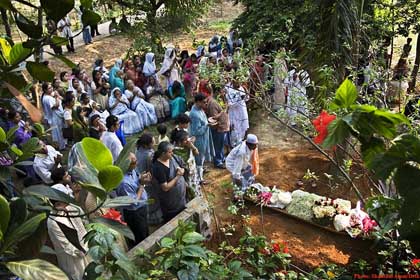![]()
Khala (auntie) was happy to see me. It was on impulse that I had gone to see her that day. I hadn’t seen her for a while and simply wanted to know how she was. She greeted me with her usual impish smile, but the smile had more to do with the fact that she had found a photographer in the house. Quickly she bundled me to the next room where a woman was holding a new born baby. Jamila had just been born, and Khala had found a photographer who could record this important moment.

The mother was quiet, and after a few photographs, I left mother and daughter in peace. This was a child the mother knew she couldn’t afford to keep. It was back in the drawing room of that old Dhanmondi house that I saw Nasreen. She had come in through the garden, one of the few in Dhanmondi that the developers had not yet buried in concrete. We’d known each other for a long time, and along with her sister Shireen, had attended many rallies organised by Nari Pokkho, the womens group that they belonged to. On many a protest, I had become an honorary woman and a proud member of the group.
Her wild curly hair bouncing as she spoke, we talked of the work we were doing together on HIV/AIDS. Positive Lives, an exhibition I had worked on as a curator and a photographer, was a show Action Aid had been touring country wide. They had organised educational programmes and gotten local celebrities to draw the crowds in. It had been a hugely successful tour. We talked of the work they were doing with the acid survivors. Rattling off ideas at great speed, for me to pursue, she dashed back to the office. Breezing out as she had breezed in. It was later that I learned that Nasreen and her husband Choton, had adopted Jamila. From then on, it was Jamila who took centre stage in Nasreen’s life. But that was the last I saw Nasreen alive.
Choton and I were fellow journalists, and whenever an important statement needed to go to press, it was Choton I would turn to. From Press Club to Motijheel to Topkhana, we would do the night time beat. He knew every editor in town and which desk to leave the press release on. Sometimes it was in search of Choton, that I would call up Nasreen. We would talk of work, but invariably the conversation veered to Jamila, never accidentally.
When I heard of the accident, I hadn’t been too concerned. A leg injury inside the parking space didn’t sound too critical. But soon I sensed something was seriously wrong. All day long people gathered at the hospital. Ministers, celebrities, acid victims, friends, ordinary people. It was through their faces that I learnt how Nasreen had touched people’s lives. It was in their tears that I found how much love she had given. Some whispered in disbelief, some wailed out loud. Choton, Shireen and Zafrulla were distraught. Khala had not yet been told. Naila was like a rock. It was she who had to break the news. She knew Nasreen the fighter, was not going to win this one. Torn up inside, Naila kept calm. As I watched inside ICU 1, I could see our fighter losing the one fight she had never prepared herself for.
Reading her obituary in the Guardian today, I remembered that it was in the same ICU where we had kept vigil when Rashed Khan Menon had been shot. I had photographed another fighter Jahanara Imam, who had been waiting outside with us. Years later, Rashed Bhai had recovered, but I had written Jahanara Khala?s obituary in the Guardian. Police brutality and cancer had taken their toll. That day I had sat with Rahnuma next to where Khala had waited and quietly held hands. It rained, as it had done when my father died and for all the deaths I could remember.
Back in Dhanmondi, Friends had arrived from far away lands. People had come from the villages. We all stood in disbelief. As I walked out of that room heavy with sadness, I heard peels of laughter from the garden. Jamila, not sure of why her mother was not there, or why there were so many people, was playing with her friends.
Her mother was called ‘Happy’ by her friends. At her funeral in Ghazipur, Happy’s friends sang songs of remembrance. They spoke of her courage and her ability to love. They spoke of her tenacity. I thought of Jamila and remembered how Happy had changed the lives of so many others, and felt it was through Jamila’s laughter that Happy should be remembered.
Shahidul Alam
1st May 2006. Dhaka




Leave a Reply
You must be logged in to post a comment.